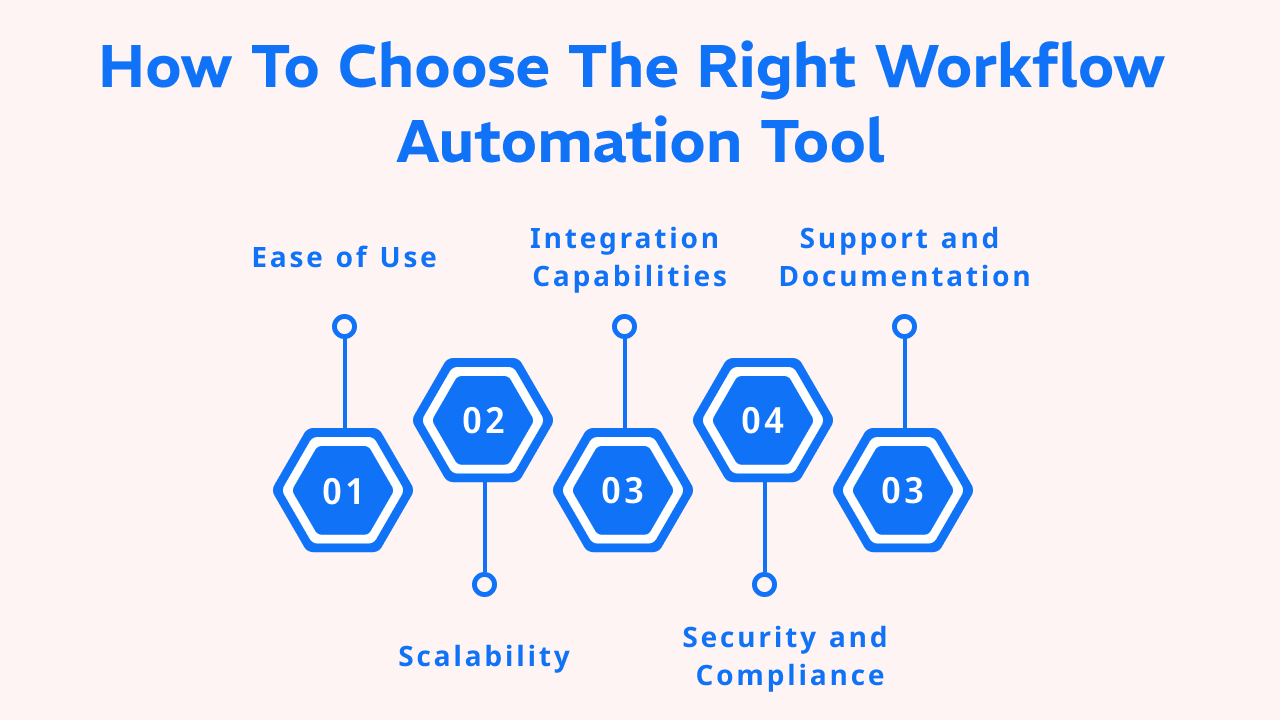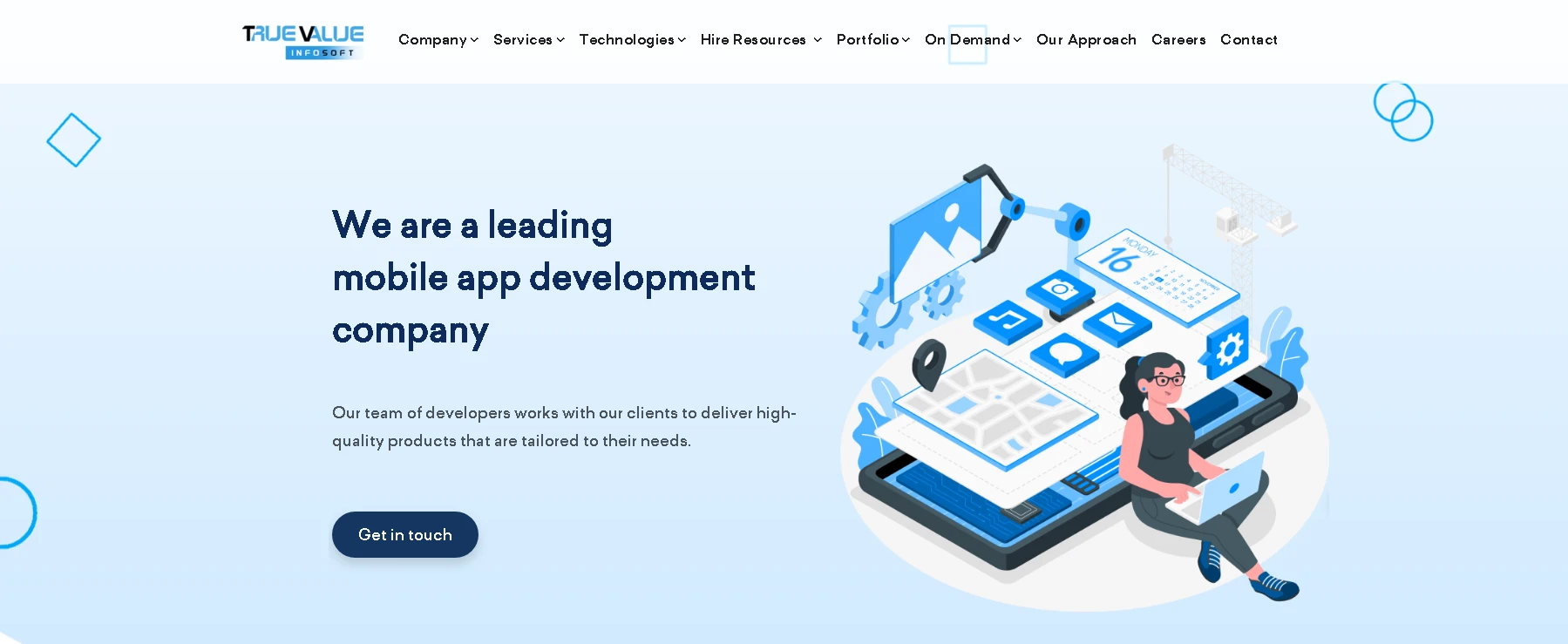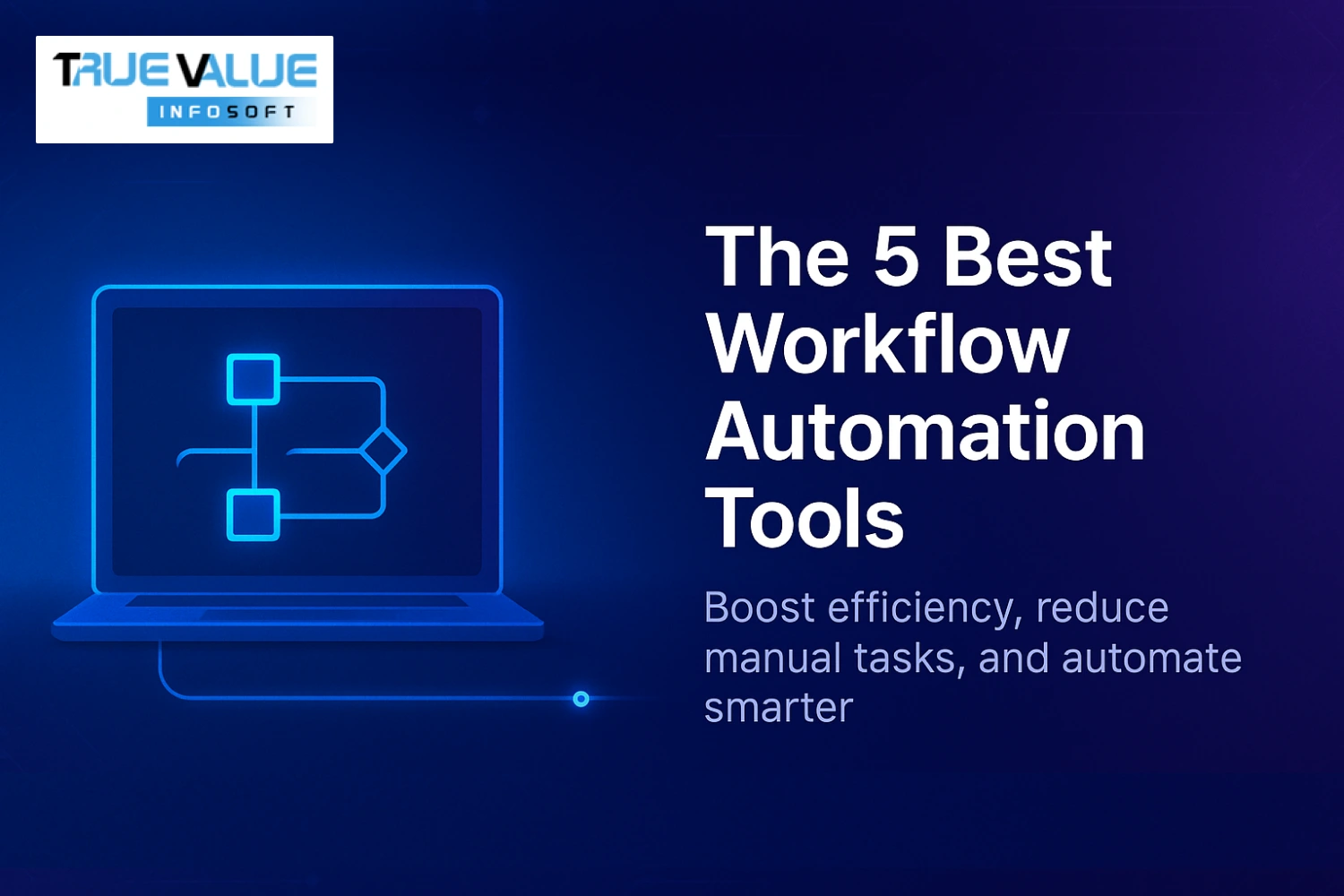Introduction
Are you struggling to streamline repetitive tasks and boost team productivity in your IT company? In today's fast-paced digital landscape, managing multiple projects, clients, and communication channels can quickly become overwhelming—especially for growing IT firms in India and beyond. That’s where workflow automation tools step in to save the day.
For IT companies like True Value Infosoft, a leading technology solutions provider in India, automation is no longer a luxury—it's a necessity. As businesses scale and digital operations expand, leveraging the right workflow automation tools can mean the difference between surviving and thriving in a competitive market. These tools not only reduce manual errors and delays but also ensure seamless collaboration, faster project turnaround times, and real-time insights into every aspect of your operations.
Whether you're a startup IT company looking to organize your processes or an established enterprise like True Value Infosoft aiming to elevate your productivity game, choosing the right automation platform is crucial. In this blog, we explore the 5 best workflow automation tools that are revolutionizing how IT companies operate in 2025—covering features, benefits, and why these tools should be in your tech arsenal today.
1. Zapier – Best for Cross-App Integration
Overview
Zapier is one of the most widely used workflow automation tools, especially popular among startups, agencies, and tech companies. Its main strength lies in its ability to integrate thousands of apps with minimal technical expertise.
Key Features
- Connects with over 6,000 apps
- Drag-and-drop workflow builder
- Multi-step automation (Zaps)
- Conditional logic (Paths)
- Scheduled automation
- Built-in task history and error reporting
Benefits for IT Companies
- Automate routine tasks like data entry, reporting, and notifications
- Enhance team productivity by connecting tools like Slack, Trello, GitHub, and Google Sheets
- Reduce time spent switching between tools
- No need for extensive coding knowledge
Popular Use Cases
- Auto-assigning new support tickets to team members
- Creating Trello cards from form submissions
- Syncing customer data from CRM to Google Sheets
- Notifying developers via Slack when a bug is reported
Pricing
- Free plan available with limited tasks
- Paid plans start at $19.99/month (Starter)
- Team and Company plans with advanced features
Integrations
- Slack, Gmail, Trello, Asana, GitHub, Jira, Salesforce, Airtable, Notion, and many more
2. Make (formerly Integromat) – Best for Visual Workflow Design
Overview
Make is a powerful workflow automation tool tailored for IT professionals who want full control and customization. It offers a visually intuitive interface to build complex automations with advanced logic, APIs, and data manipulation.
Key Features
- Visual scenario builder
- API integration and webhooks
- Iterators and aggregators
- Scheduling and conditional filters
- Extensive module support
- Error handling with retry logic
Benefits for IT Companies
- Manage complex API workflows with ease
- Great for automating DevOps, monitoring, and data syncing
- Streamline client onboarding processes
- Useful for backend tasks like server alerts or system checks
Popular Use Cases
- API monitoring and alerting
- Syncing data between MySQL, Airtable, and Slack
- Automating marketing and support workflows
- Building custom bots for notifications
Pricing
- Free plan available
- Paid plans start at $9/month (Core)
- Pro and Teams plans available for growing teams
Integrations
- Connects with thousands of apps and custom APIs
- Native integrations with Notion, Airtable, Discord, HTTP modules, Dropbox, etc.
3. n8n – Best Open-Source Workflow Automation Tool
Overview
n8n (pronounced "n-eight-n") is an open-source workflow automation platform favored by IT departments and developers who value flexibility, data privacy, and customization.
Key Features
- Node-based editor for building workflows
- Self-hosted and cloud options
- Supports custom JavaScript code blocks
- Extensive library of pre-built integrations
- Webhook and API capabilities
Benefits for IT Companies
- Complete control over infrastructure with self-hosting
- Easily integrate internal tools with custom code
- Cost-effective for companies with dev resources
- Great for secure and scalable automation
Popular Use Cases
- Automating CI/CD pipelines
- Monitoring system uptime with alerts
- Generating custom reports from log files
- Connecting internal databases and third-party tools
Pricing
- Free to use (self-hosted)
- Cloud plans start at $20/month
- Enterprise plans available with premium support
Integrations
- GitHub, Slack, MongoDB, MySQL, PostgreSQL, Twilio, S3, Google services, and many more
4. Workato – Best for Enterprise-Grade Integrations
Overview
Workato is a robust integration and automation platform designed for mid-to-large IT enterprises. It combines iPaaS (Integration Platform as a Service) capabilities with advanced automation, making it suitable for complex and secure enterprise environments.
Key Features
- AI-powered automation builder
- Enterprise-level governance and security
- Hundreds of pre-built connectors (recipes)
- Real-time data syncing
- Role-based access control
Benefits for IT Companies
- Centralize workflows across development, HR, finance, and customer support
- Create secure automations with SOC 2 compliance
- Orchestrate hybrid cloud infrastructure
- Automate DevOps, ITSM, and ERP processes
Popular Use Cases
- Automated incident management between Jira and ServiceNow
- Real-time synchronization between Salesforce and SAP
- Customer onboarding automation across tools
- Intelligent document processing with AI
Pricing
- Custom pricing based on company size and usage
- Offers free trial and demo upon request
Integrations
- Salesforce, SAP, Oracle, Netsuite, Jira, ServiceNow, GitHub, Zendesk, etc.
5. Kissflow – Best All-in-One Workflow Platform
Overview
Kissflow is an end-to-end workflow automation and digital workplace platform designed for non-technical and technical users alike. It’s ideal for IT companies looking to manage internal operations and cross-departmental workflows.
Key Features
- Low-code app builder
- Customizable forms and workflows
- Built-in analytics and dashboards
- Role-based access
- Mobile-ready interface
Benefits for IT Companies
- Centralize IT request management
- Build automated approval processes for procurement, HR, and finance
- Monitor process efficiency with built-in reporting
- No steep learning curve for non-tech teams
Popular Use Cases
- IT service request forms and automation
- Purchase order approvals
- Onboarding workflows
- Compliance checks and reporting
Pricing
- Starts at $15/user/month
- Custom enterprise plans available
- Offers free trial
Integrations
- Google Workspace, Microsoft 365, Zapier, Dropbox, Salesforce, QuickBooks, etc.
Comparison Table
| Tool | Best For | Pricing | Key Strengths | Suitable For |
|---|---|---|---|---|
| Zapier | Cross-app automation | Free – $19.99+/month | Massive app ecosystem, ease of use | Startups & SMBs |
| Make | Visual workflow building | Free – $9+/month | Visual logic, deep API control | Developers & IT Ops |
| n8n | Open-source & self-hosting | Free – $20+/month | Customization, privacy | Dev teams & IT admins |
| Workato | Enterprise integrations | Custom pricing | iPaaS, security, scalability | Mid-large IT firms |
| Kissflow | All-in-one business workflow tool | $15/user/month+ | Easy UI, internal workflow automation | Cross-department use |
How to Choose the Right Workflow Automation Tool

Choosing the best workflow automation tool depends on your company’s size, technical capabilities, budget, and specific automation needs. Here are key factors to consider:
- Ease of Use: Do you need a tool that non-technical teams can use, or one tailored for developers?
- Scalability: Will the tool support your growth and increasing automation complexity?
- Integration Capabilities: Can it connect with all the tools your teams rely on?
- Security and Compliance: Is the platform compliant with your organization’s security requirements?
- Support and Documentation: Is there strong customer support, documentation, and community forums?
Why IT Companies Must Invest in Workflow Automation in 2025
- Increased Productivity: Automate repetitive tasks and free up time for strategic initiatives.
- Enhanced Accuracy: Reduce human error with automated processes.
- Faster Turnaround Times: Improve client satisfaction by delivering results quickly.
- Scalability: Handle increasing project complexity without scaling headcount.
- Improved Collaboration: Seamless data flow between tools enhances communication and coordination.
Conclusion
The future of IT depends on how well companies adapt to intelligent automation. Workflow automation tools like Zapier, Make, n8n, Workato, and Kissflow are transforming how IT businesses operate, collaborate, and grow. From automating internal processes to managing complex DevOps pipelines, these tools offer unparalleled value.

True Value Infosoft, the best IT company in India, understands the power of streamlined workflows. By integrating the right automation tools, we’ve not only improved our productivity but also enhanced client satisfaction. If you’re looking to build, integrate, or scale IT automation solutions, connect with us today.
FAQs
A workflow automation tool automates repetitive tasks and business processes by connecting apps and services through triggers and actions.
Zapier is ideal for IT startups due to its ease of use, affordability, and wide range of integrations.
Yes. With self-hosting and custom code options, n8n is ideal for enterprises with strong development teams.
It improves efficiency, reduces errors, accelerates operations, and enables better collaboration.
Some tools like Zapier and Kissflow require little to no coding, while Make, n8n, and Workato are better suited for users with some technical background.





